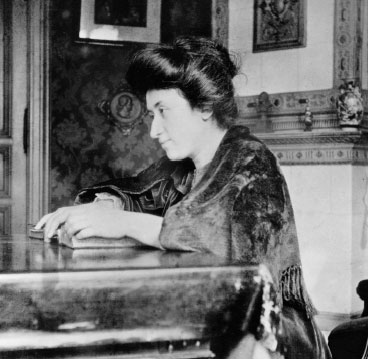the last 30 years of union developments
suggest she had this particular problematic by the balls

she goes on at some length
including this which might well serve to headline the ast 30 years in the oecd countries :
" if we examine the large factors of social development
we see that we are not moving toward an epoch marked by
a victorious development of trade unions
but rather toward a time when the hardships of labour unions will increase."
analysis ???
she calls this
the second stage of union development and it is exactly opposed to the first stage in
the direction of its motions
ie unlike schmidt who saw the first stage as the only stage and a stage producing
ever better results t for union growth and prosperity
till labor's share of total VA
threatens to completely crowd out the exploiter share
" Once industrial development has attained its highest possible point and capitalism has entered its descending phase on the world market "
that is" highest possible point"
as in reached the existing edge of that moments universal technical production frontier
--- UTPF is a concept she implies not here of course but above
in her wage law outline ---
and "highest possible point" i think oughta be limited to
any one particular commodity producing region
with its inevitable incompleteness and uneven ness
here we are better off in my estimation
to avoid vague gestures
toward some universal "capitalism" going thru unrepeatable world historical stages
so .....
i would read this passage like this :
where she has the word "capitalism"
insert something like :
any one legally bounded state centered but economically ever more open
market region
--nice and graceful eh ??--
qualifier
a region dominated by a locally situated advanced system of inter connected productive capitals
for "descending phase "
i might inject as a for instance
today's "declining " US rust belt
vis a vis the han boom belt
as weighed on the fixed forex scales mediating world markets (heh heh heh)
-- i'm fairly certain this transgresses the limits of the simple underconsumptionist model in rosa's head ---
now her prophecy :
" the trade union struggle will become doubly difficult."
she was right more then once and wrong a few times in between because of the repeats and "world historical new beginnings "--think post 1939 --
" In the first place, the objective conjuncture of the market will be less favourable to the sellers of labour power, because the demand for labour power will increase at a slower rate and labour supply more rapidly than at present."
demand side
think ever spreading and deepening import competition like post 73 here in the states
ie chronic trade deficits
supply side
immigration and increased rate of recycling of the job force
thru gains in productivity per hour
innovation driven de skilling and specific sectoral/locational trade job displacement
" In the second place, the capitalists themselves, in order to make up for losses suffered on the world market, will make even greater efforts than at present to reduce the part of the total product going to the workers (in the form of wages). "
intensified assaults on labor costs as profit margins get squeezed by import competition
-- not sure this is adding anything to point one really if point ones logic is worked all the way thru --
" The situation in England already offers us a picture of the beginning of the second stage of trade union development."
indeed it was for certain future intervals
and for other capitalist national market systems as well
----------------
roas concludes:
" Trade union action is reduced of necessity to the simple defence of already realised gains, and even that is becoming more and more difficult."
sound like the rust belt blues to U ???
" Such is the general trend of things in our society."
hmm gotta watch you keep that prophecy specifically locate and finite in duration
" The counterpart of this tendency should be the development of the political side of the class struggle"
rosa hoped to move the spontaneous radical capitalist state challenging syndicalism
of existing militant wage class elements
with the inevitable vision that conjures up
of a general strike final conflict
into a mass based rev party building project